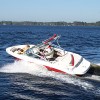 I know who screwed up your favorite fishing hole and why the fish you catch may taste a little funny. Everyone has seen them, the recreational boats that have 3 smokers aboard going out for a day of beer and fishing. Upon return, there are no empty beverage containers, cigarette butts, or single-use plastic bags. They consumed the goods and disposed of the waste. Unfortunately, they disposed of it while on-site at your favorite fishing spot; not that littering is acceptable anywhere.
I know who screwed up your favorite fishing hole and why the fish you catch may taste a little funny. Everyone has seen them, the recreational boats that have 3 smokers aboard going out for a day of beer and fishing. Upon return, there are no empty beverage containers, cigarette butts, or single-use plastic bags. They consumed the goods and disposed of the waste. Unfortunately, they disposed of it while on-site at your favorite fishing spot; not that littering is acceptable anywhere.
Most boaters feel that the ocean is a massive body of water, and it is. But the problem is that most boaters travel the same routes, hang out at the same popular fishing holes, and litter the same area. This causes bottom carpeting. The food chain in any area starts with the bugs and seaweed living on the bottom. What happens is that the bottom becomes covered with cans and bottles and the exposed sea or lake floor of mud and seaweed is reduced.
If you have 20 littering boats at your favorite fishing hole, drinking and littering two 12 packs for 100 days during the year, they would have littered 24,000 beverage containers. This means that each year, those boaters carpet 28,000 square feet of the bottom terrain in your favorite fishing hole. Think about the cumulative 10-year effect on the bottom structure and what fishing in this area would be like if that litter was not there.
Aside from littering the bottom with beer and beverage bottles, cigarette butts are one of the worst items to flick overboard. Feeder and surface fish will have eaten them before the end of the day. Their digestive juices extract the chemicals from the plastic in the filter and deposit these cancer-causing agents into the muscle and fat tissue of the fish you are catching and grilling up at home.
The bulk of the carcinogens in every cigarette are collected in the filter. Each filter contains 69 known carcinogens. Some of these filter-trapped carcinogens never enter a smoker’s bloodstream when they smoke a cigarette, but when you start eating these cancer-causing agents, they enter your system and will have an accumulated effect on you.
Several other items inadvertently end up in the water whenever they are brought aboard a boat. The single-use plastic bags containing all the items you picked up on your way to the marina always seem to catch air and set sail as soon as you use the last item in the bag. The other item that ends up in the water is Styrofoam lids from coolers. Everyone at one time or another has bought one of these cheap coolers because they needed cooler space or forgot to bring one of the coolers from home. The lids on these coolers seem to fly better than a kite on a windy day.
Here are some easy solutions for boaters to prevent your favorite fishing hole from continuing to become trashed:
- Share this article with as many fishing contacts as possible. It is important to educate other fishermen and make them aware of the real impact of their actions. Their litter sinks to the bottom and is therefore unseen and perceived as not having any effect on the vast ocean.
- Take some binoculars along on your trip. If the fish are not biting, start watching the other boats, especially if they are catching fish and you are not. You may be able to figure out what they are doing right in addition to spotting a litterer in your favorite fishing hole. If you witness another boat littering, call them out over the radio.
- Spread the word. Tell everyone which boat is out in your favorite fishing spot trashing the place.
- Fishing tournaments should do a declared beverage count when leaving the dock. Any boat returning without their empties should be disqualified.
- Do not take the single-use plastic bags on board. Dump the stuff on the boat and find a place to stash all of your goodies.
- Use an empty beverage container as your ashtray. It will trap and keep the butts until you reach the docks.
- For the Styrofoam containers, use the duct tape fix. Tape a beverage or similar weight object to the top of the lid and you will not have the lid blowing off your boat allowing you to reuse the cooler.
Increased regulation is not the answer. I believe education and peer pressure by fishermen who care about their sport can significantly reduce this problem. If all of this accumulated trash stayed on top of the water in favorite fishing holes instead of carpeting the bottom, this problem would have been corrected a long time ago, since it would be such an eyesore to the community surrounding it. Fishermen love the environment and can appreciate fishing in a pristine area filled with fish.
